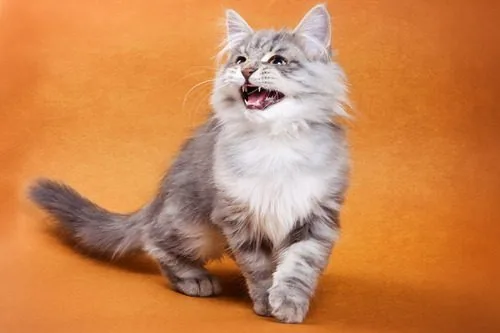
Our Veterinary Blog
Why Is My Male Cat Meowing So Much?
Male cats are known for their independence, but when they start meowing excessively and out of nowhere, it’s natural for pet owners to be concerned. This sudden vocalization can be confusing, leaving you wondering what your cat is trying to communicate. From changes in their environment to potential health concerns, there are various reasons your male cat may be meowing more than usual. Learning about these reasons can help you determine whether it’s time to call Lakeland Animal Clinic at (863) 688-3338 for professional guidance.

Common Reasons for a Male Cat Meowing Frequently
If your male cat has started meowing more frequently, he may be trying to tell you something. Cats meow for many reasons, ranging from behavioral changes to medical issues. Here are some of the most common explanations:
Changes in Routine or Environment
Cats are creatures of habit, and any disruption to their daily routine can lead to increased vocalization. A new pet, a recent move, or even rearranging furniture can make your cat feel uneasy. Male cats often meow to express their discomfort or to seek reassurance in unfamiliar situations. If you’ve recently adopted a new animal or welcomed a baby into the home, your cat may feel the need to reassert his place in the household. He might also be expressing curiosity about these new changes. Spend extra time engaging with your cat to help him adjust.
Hunger or Thirst
Cats are skilled at letting their owners know when they need something, and a persistent meow is often their way of saying, “Feed me!” Check to ensure your cat’s food and water bowls are filled and accessible. If his meowing persists even after being fed, he may be craving a different type of food or a higher-quality diet.
Medical Concerns That Could Cause Excessive Meowing
Excessive meowing in male cats can sometimes signal underlying medical issues. If your cat’s behavior is unusual or accompanied by other symptoms, you should consult your veterinarian to rule out potential health concerns.
Pain or Discomfort
Cats may meow more often when they are in pain. Whether it’s a minor injury or an internal issue, vocalizing is their way of letting you know something is wrong. Look for other signs of distress, such as limping, reduced appetite, or hiding.
Hyperthyroidism
Hyperthyroidism, a condition that affects a cat’s thyroid gland, can cause an increase in appetite, weight loss, and restlessness. One of the most noticeable symptoms is excessive meowing, especially at night. If you suspect your male cat may have hyperthyroidism, schedule an appointment with Lakeland Animal Clinic at (863) 688-3338 to discuss testing and treatment options.
Urinary Tract Issues
Male cats are particularly prone to urinary tract problems, which can cause discomfort and lead to frequent, loud meowing. Straining to urinate, blood in the urine, or frequent trips to the litter box are signs that require immediate veterinary attention.
Behavioral Causes for Increased Meowing
Not all sudden vocalization is due to physical health concerns. Behavioral changes or emotional triggers can also lead to excessive meowing.
Seeking Attention
Cats are social animals and may meow more when they feel ignored or lonely. If your schedule has changed or you’ve been spending less time at home, your cat might be seeking more interaction. Playtime and affection can go a long way in curbing attention-seeking meows. Aim for at least 20–30 minutes of interactive play each day to keep your cat mentally stimulated.
Mating Behavior
If your male cat hasn’t been neutered, his meowing may be related to mating instincts. Male cats often become more vocal during mating season, calling out to nearby females. Neutering can help reduce this behavior, as well as other mating-related habits like spraying or roaming. If your cat isn’t neutered yet, contact Lakeland Animal Clinic to discuss scheduling the procedure.
Stress or Anxiety
Cats can experience stress for many reasons, including loud noises, new animals, or changes in their environment. Increased meowing can be a sign of anxiety as your cat tries to cope with what’s happening around him. Creating a safe, quiet space for your cat to retreat to during stressful times can help ease his anxiety. Consider using calming sprays or diffusers to promote relaxation.
When It’s Necessary to Consult Your Veterinarian
If your male cat’s frequent meowing doesn’t subside or seems excessive, it’s time to seek veterinary advice. Some situations require prompt attention:
- Your cat’s meowing is accompanied by changes in appetite or weight.
- You notice symptoms like lethargy, vomiting, or diarrhea.
- Your cat is showing signs of pain or distress, such as limping or hiding.
- There are signs of a urinary tract issue, such as blood in the litter box.
The team at Lakeland Animal Clinic is here to help. Contact us to schedule an exam if you’re concerned about your cat’s health.
Supporting Your Cat’s Comfort and Well-Being
Excessive meowing in male cats can be concerning, but understanding the possible causes can help you address the issue with confidence. Whether it’s a simple case of hunger, an environmental change, or a potential health concern, paying attention to your cat’s behavior is the first step in finding a solution. If you’re worried about your male cat meowing all of a sudden, reach out to Lakeland Animal Clinic for expert advice and compassionate care. Call (863) 688-3338 to schedule an appointment today.
Recent Posts
About Us
Family is family, whether it has two legs or four. At Lakeland Animal Clinic, we've spent the last 40 years healing and caring for your pets. As a family-operated practice, we know that family is about more than simply being related. Animals give us the ability to develop strong bonds and feel great compassion for a fellow living creature.
